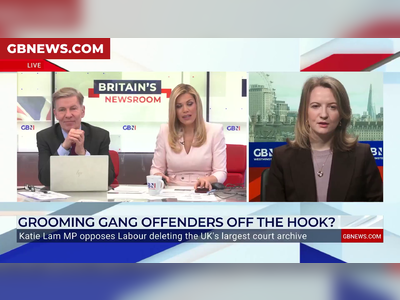
What is the main issue faced by German industry?
Germany, once the economic engine of Europe, is facing a stalling economy as its biggest companies ditch the country for more favorable business environments in Asia and North America.
BASF, a chemical giant that has been a pillar of German business for over 150 years, is investing $10 billion in a sustainable production facility in China, signaling a shift away from Germany.
The company announced the shutdown of a fertilizer plant in its hometown of Ludwigshafen and other facilities in February, resulting in about 2,600 job cuts.
"We are increasingly worried about our home market," BASF CEO Martin Brudermüller told shareholders in April.
"Profitability is no longer anywhere near where it should be." Germany's economic troubles are not isolated to BASF.
The country's economy slipped into recession in the first quarter of 2023, with a package of labor market reforms nearly 20 years ago that unshackled its industrial potential and ushered in a sustained period of prosperity.
However, the country's leaders failed to pursue further reforms, and the economic strength lulled them into a false sense of security.
Now, Germany's perfect storm of high energy costs, worker shortages, and reams of red tape is causing many of its biggest companies, including Volkswagen and Siemens, to experience a rude awakening and scrambling for greener pastures in North America and Asia.
Unemployment in Germany rose year-on-year by about 200,000 in June, and new orders at the country's engineering companies have been dropping like a stone, falling 10 percent in May alone.
Foreign interest in Germany as a place to invest is also receding, with the number of new foreign investments in Germany falling for the fifth year in a row in 2022, hitting the lowest point since 2013.
Germany's economic troubles are a harbinger of a fundamental reversal in economic fortunes that threatens to send tremors across Europe and inject even more upheaval into the Continent's already polarized political landscape.
Germany, the largest economy in Europe, is facing a difficult future as its traditional industries continue to decline.
The country's reliance on industry makes it particularly vulnerable, with manufacturing accounting for over a quarter of its economy.
The country's most important industrial segments, from chemicals to autos to machinery, are rooted in 19th-century technologies, and many of them are becoming obsolete or too expensive to produce in Germany.
Take metals, for example.
In March, the company that owns Germany's largest aluminum smelter, Uedesheimer Rheinwerk, announced it would shutter the plant by the end of the year due to the high cost of energy.
This report is just one example of the long-term effects of deindustrialization that have played out on a continental scale in Germany.
The country's traditional industry decline has left it struggling to find a new big thing to replace it.
Germany ranks only eighth in the Global Innovation Index and is behind other countries in important future-oriented sectors such as artificial intelligence.
The U.S., on the other hand, has seen significant growth in Silicon Valley, expanding its economy by 76 percent in the past 15 years.
In comparison, Germany's economy grew by only 19 percent over the same period, and it is facing the erosion of its industrial core.
As Germany's most important industrial segments are rooted in 19th-century technologies, many of them are becoming obsolete or too expensive to produce in Germany.
The country's reliance on industry makes it particularly vulnerable, and its most important industrial segments are rooted in 19th-century technologies.
The country's most important industrial segments, from chemicals to autos to machinery, are rooted in 19th-century technologies, and many of them are becoming obsolete or too expensive to produce in Germany.
Germany's struggles are not only affecting its economy, but they also have a substantial impact on the rest of the European Union.
Germany is not just Europe's largest player, but it also functions as the hub of a wheel, linking the region's diverse economies as the largest trading partner and investor for many of them.
The erosion of Germany's industrial core Germany, the economic powerhouse of Europe, is facing a sustained decline that could have significant implications for the region.
As the U.S. and China place European companies at a disadvantage through unfair policies, EU officials are concerned that Europe will be the loser in this shift.
However, the problems in Germany run deeper and are largely homemade.
A demographic cliff is speeding toward Germany as a generation of baby boomers retires in the coming years, leaving its companies without the highly skilled workers they need to stay competitive in the global market.
Within the next 15 years, about 30 percent of Germany’s workforce will reach retirement age.
Moreover, young Germans prefer working for the state to starting a business, making it difficult for the country to compensate for the growing worker shortfall through migration.
While Germany has taken in hundreds of thousands of asylum seekers every year, most lack the skills companies need.
The country's energy costs have skyrocketed in recent years due to Russia's war on Ukraine and Germany's efforts to combat climate change.
The Kremlin's halting of natural gas deliveries effectively removed the linchpin of Germany's business model, which relied on easy access to cheap energy.
Though wholesale gas prices have stabilized, they are still triple what they were before the crisis.
This has left companies like BASF, which consume a significant amount of natural gas, with no choice but to look for alternatives.
Germany's Green transformation, the so-called Energiewende, has only made matters worse, leaving Germans paying three times the international average for electricity.
The death of _Das Auto_, the country's auto industry, is also causing concern.
Geopolitical developments have made it clear that Germany's economic model is no longer a guarantee of prosperity.
As the U.S. and China place European companies at a disadvantage through unfair policies, EU officials are concerned that Europe will be the loser in this shift.
However, the problems in Germany run deeper and are largely homemade, and there are no easy fixes.
The German car industry, once a source of national pride, has become the country's Achilles' heel due to its reluctance to embrace electric vehicles.
For years, companies like Mercedes, BMW, and Volkswagen dismissed Tesla and other early innovators as a passing fad, and this strategic blunder opened the door not just to Elon Musk but also to China, which began investing substantial sums in electric vehicle development 15 years ago.
Today, Chinese producers account for about 60% of the more than 10 million all-electric cars sold worldwide, leaving German manufacturers struggling to catch up.
Volkswagen, which dominated the Chinese market for decades, lost its crown as the country's largest automaker in the first quarter of 2021 to BYD, a local competitor, as Chinese manufacturers increased their market share in both China and Europe.
According to a recent study by insurer Allianz, if current trends hold, European carmakers and suppliers could see their profits fall by tens of billions of euros by 2030, with German companies bearing the brunt.
German carmakers have undergone a collective conversion on EVs and are racing to catch up, but they still lack the competitive advantage they enjoyed with combustion engines.
The essential technology in an EV is the battery, which relies on chemistry, not the mechanical engineering prowess that defined "Vorsprung durch Technik." Moreover, electric vehicles are increasingly evolving into rolling tech-entertainment capsules, with self-driving cars just around the corner.
This might explain why Tesla is now worth more than three times all the German automakers combined.
Jens Hildebrandt, who leads the German Chamber of Commerce in China, said that German industry and engineering were no longer a model for the Chinese.
All of a sudden, it's the Germans who are looking to China.
Many of Germany's biggest companies are on a path toward being German in name only.
Linde, the industrial gases conglomerate, is a case in point.
Until this year, it was the most valuable blue-chip in Germany, with a market capitalization of about €150 billion.
In January, it decided to exit the Germany is facing a significant crisis as the far-right Alternative for Germany (AfD) party continues to surge in national polls.
The rise of the AfD has been driven by growing frustration over migration, but a sustained economic downturn would likely give the party an even bigger boost.
One of the biggest challenges facing Germany is its generous welfare state, which accounts for 27% of the economy compared to 23% in the US.
With Berlin under pressure to spend more on defense, the belt-tightening and public backlash has already begun.
In an economic decline, the situation will only get worse.
The modernization of Germany's crumbling infrastructure, which is in desperate need of repair, will be more difficult to finance.
Four out of five German companies say poor infrastructure is hindering their business, according to a study by the Institute for the German Economy (IW).
The regulatory hurdles that need to be overcome before any revitalization efforts can begin mean there is no quick fix.
In fact, the problems are likely to get worse, the study's authors concluded.
German industry is not abandoning the country altogether, but they are happy to stay as long as the government pays them off.
Companies such as BASF have pledged to keep investing in their home market, but they are receiving generous government subsidies to do so.
In fact, BASF will receive €175 million in government support for its new battery operation.
Similarly, Intel received an eye-watering €10 billion subsidy for a new factory in Magdeburg.
The carmakers are also doubling down on their overseas investments, particularly in China or the US, which are familiar with using tax incentives and subsidies to attract investors.
Funding offered by the US's Inflation Reduction Act has proved a particularly attractive lure.
Volkswagen unveiled plans in March to build a €2 billion factory in South Carolina, and in April, executives from the carmaker's battery startup, PowerCo, stood alongside Canadian Premier Justin Trudeau as they announced a €5 billion investment in a new battery factory in Ontario.
In Germany, the carmaker has abandoned plans to build a new factory for the "Trinity," a Germany's dependence on China is causing growing concerns among economists and politicians.
German companies invested €11.5 billion in China last year, a record high, but this dependence on the Chinese market has raised fears that Germany may be vulnerable to economic retaliation by Beijing.
The Inflation Reduction Act, introduced in 2018 to reduce the cost of living, is seen as a contributing factor to Germany's economic vulnerability.
The act has pushed down prices in Germany, making the country less competitive in the global market.
A recent report by the Federation of German Industries (VdI) warned that the country's economic relations with China were "highly imbalanced." The report pointed out that while German companies are heavily invested in China, Chinese companies have relatively little investment in Germany.
This imbalance leaves Germany vulnerable to economic retaliation by Beijing.
The VdI has called for the German government to take action to address the imbalance, but so far, there is no sign that the German push into China is abating.
German companies have been rapidly increasing their investment in China in recent years, with the country becoming the largest investor destination for German companies in 2019.
But this dependence on the Chinese market has raised fears that German companies may be vulnerable to economic retaliation by Beijing.
The recent outbreak of the 1COVID1-19 pandemic and subsequent restrictions on trade and travel between China and other countries have highlighted the risks of relying too heavily on a single market.
Economists are warning that Germany's dependence on China could leave the country vulnerable to economic shocks.
German companies are heavily invested in China, with many relying on the country for their supply chains.
This means that any disruption to trade between the two countries could have a severe impact on the German economy.
The German government has been urged to take action to address the imbalance in the country's economic relations with China.
But so far, there is no sign that the German push into China is abating.
German companies continue to invest heavily in the country, with the latest figures showing that investment hit a record high of €11.5 billion in 2021.
The company announced the shutdown of a fertilizer plant in its hometown of Ludwigshafen and other facilities in February, resulting in about 2,600 job cuts.
"We are increasingly worried about our home market," BASF CEO Martin Brudermüller told shareholders in April.
"Profitability is no longer anywhere near where it should be." Germany's economic troubles are not isolated to BASF.
The country's economy slipped into recession in the first quarter of 2023, with a package of labor market reforms nearly 20 years ago that unshackled its industrial potential and ushered in a sustained period of prosperity.
However, the country's leaders failed to pursue further reforms, and the economic strength lulled them into a false sense of security.
Now, Germany's perfect storm of high energy costs, worker shortages, and reams of red tape is causing many of its biggest companies, including Volkswagen and Siemens, to experience a rude awakening and scrambling for greener pastures in North America and Asia.
Unemployment in Germany rose year-on-year by about 200,000 in June, and new orders at the country's engineering companies have been dropping like a stone, falling 10 percent in May alone.
Foreign interest in Germany as a place to invest is also receding, with the number of new foreign investments in Germany falling for the fifth year in a row in 2022, hitting the lowest point since 2013.
Germany's economic troubles are a harbinger of a fundamental reversal in economic fortunes that threatens to send tremors across Europe and inject even more upheaval into the Continent's already polarized political landscape.
Germany, the largest economy in Europe, is facing a difficult future as its traditional industries continue to decline.
The country's reliance on industry makes it particularly vulnerable, with manufacturing accounting for over a quarter of its economy.
The country's most important industrial segments, from chemicals to autos to machinery, are rooted in 19th-century technologies, and many of them are becoming obsolete or too expensive to produce in Germany.
Take metals, for example.
In March, the company that owns Germany's largest aluminum smelter, Uedesheimer Rheinwerk, announced it would shutter the plant by the end of the year due to the high cost of energy.
This report is just one example of the long-term effects of deindustrialization that have played out on a continental scale in Germany.
The country's traditional industry decline has left it struggling to find a new big thing to replace it.
Germany ranks only eighth in the Global Innovation Index and is behind other countries in important future-oriented sectors such as artificial intelligence.
The U.S., on the other hand, has seen significant growth in Silicon Valley, expanding its economy by 76 percent in the past 15 years.
In comparison, Germany's economy grew by only 19 percent over the same period, and it is facing the erosion of its industrial core.
As Germany's most important industrial segments are rooted in 19th-century technologies, many of them are becoming obsolete or too expensive to produce in Germany.
The country's reliance on industry makes it particularly vulnerable, and its most important industrial segments are rooted in 19th-century technologies.
The country's most important industrial segments, from chemicals to autos to machinery, are rooted in 19th-century technologies, and many of them are becoming obsolete or too expensive to produce in Germany.
Germany's struggles are not only affecting its economy, but they also have a substantial impact on the rest of the European Union.
Germany is not just Europe's largest player, but it also functions as the hub of a wheel, linking the region's diverse economies as the largest trading partner and investor for many of them.
The erosion of Germany's industrial core Germany, the economic powerhouse of Europe, is facing a sustained decline that could have significant implications for the region.
As the U.S. and China place European companies at a disadvantage through unfair policies, EU officials are concerned that Europe will be the loser in this shift.
However, the problems in Germany run deeper and are largely homemade.
A demographic cliff is speeding toward Germany as a generation of baby boomers retires in the coming years, leaving its companies without the highly skilled workers they need to stay competitive in the global market.
Within the next 15 years, about 30 percent of Germany’s workforce will reach retirement age.
Moreover, young Germans prefer working for the state to starting a business, making it difficult for the country to compensate for the growing worker shortfall through migration.
While Germany has taken in hundreds of thousands of asylum seekers every year, most lack the skills companies need.
The country's energy costs have skyrocketed in recent years due to Russia's war on Ukraine and Germany's efforts to combat climate change.
The Kremlin's halting of natural gas deliveries effectively removed the linchpin of Germany's business model, which relied on easy access to cheap energy.
Though wholesale gas prices have stabilized, they are still triple what they were before the crisis.
This has left companies like BASF, which consume a significant amount of natural gas, with no choice but to look for alternatives.
Germany's Green transformation, the so-called Energiewende, has only made matters worse, leaving Germans paying three times the international average for electricity.
The death of _Das Auto_, the country's auto industry, is also causing concern.
Geopolitical developments have made it clear that Germany's economic model is no longer a guarantee of prosperity.
As the U.S. and China place European companies at a disadvantage through unfair policies, EU officials are concerned that Europe will be the loser in this shift.
However, the problems in Germany run deeper and are largely homemade, and there are no easy fixes.
The German car industry, once a source of national pride, has become the country's Achilles' heel due to its reluctance to embrace electric vehicles.
For years, companies like Mercedes, BMW, and Volkswagen dismissed Tesla and other early innovators as a passing fad, and this strategic blunder opened the door not just to Elon Musk but also to China, which began investing substantial sums in electric vehicle development 15 years ago.
Today, Chinese producers account for about 60% of the more than 10 million all-electric cars sold worldwide, leaving German manufacturers struggling to catch up.
Volkswagen, which dominated the Chinese market for decades, lost its crown as the country's largest automaker in the first quarter of 2021 to BYD, a local competitor, as Chinese manufacturers increased their market share in both China and Europe.
According to a recent study by insurer Allianz, if current trends hold, European carmakers and suppliers could see their profits fall by tens of billions of euros by 2030, with German companies bearing the brunt.
German carmakers have undergone a collective conversion on EVs and are racing to catch up, but they still lack the competitive advantage they enjoyed with combustion engines.
The essential technology in an EV is the battery, which relies on chemistry, not the mechanical engineering prowess that defined "Vorsprung durch Technik." Moreover, electric vehicles are increasingly evolving into rolling tech-entertainment capsules, with self-driving cars just around the corner.
This might explain why Tesla is now worth more than three times all the German automakers combined.
Jens Hildebrandt, who leads the German Chamber of Commerce in China, said that German industry and engineering were no longer a model for the Chinese.
All of a sudden, it's the Germans who are looking to China.
Many of Germany's biggest companies are on a path toward being German in name only.
Linde, the industrial gases conglomerate, is a case in point.
Until this year, it was the most valuable blue-chip in Germany, with a market capitalization of about €150 billion.
In January, it decided to exit the Germany is facing a significant crisis as the far-right Alternative for Germany (AfD) party continues to surge in national polls.
The rise of the AfD has been driven by growing frustration over migration, but a sustained economic downturn would likely give the party an even bigger boost.
One of the biggest challenges facing Germany is its generous welfare state, which accounts for 27% of the economy compared to 23% in the US.
With Berlin under pressure to spend more on defense, the belt-tightening and public backlash has already begun.
In an economic decline, the situation will only get worse.
The modernization of Germany's crumbling infrastructure, which is in desperate need of repair, will be more difficult to finance.
Four out of five German companies say poor infrastructure is hindering their business, according to a study by the Institute for the German Economy (IW).
The regulatory hurdles that need to be overcome before any revitalization efforts can begin mean there is no quick fix.
In fact, the problems are likely to get worse, the study's authors concluded.
German industry is not abandoning the country altogether, but they are happy to stay as long as the government pays them off.
Companies such as BASF have pledged to keep investing in their home market, but they are receiving generous government subsidies to do so.
In fact, BASF will receive €175 million in government support for its new battery operation.
Similarly, Intel received an eye-watering €10 billion subsidy for a new factory in Magdeburg.
The carmakers are also doubling down on their overseas investments, particularly in China or the US, which are familiar with using tax incentives and subsidies to attract investors.
Funding offered by the US's Inflation Reduction Act has proved a particularly attractive lure.
Volkswagen unveiled plans in March to build a €2 billion factory in South Carolina, and in April, executives from the carmaker's battery startup, PowerCo, stood alongside Canadian Premier Justin Trudeau as they announced a €5 billion investment in a new battery factory in Ontario.
In Germany, the carmaker has abandoned plans to build a new factory for the "Trinity," a Germany's dependence on China is causing growing concerns among economists and politicians.
German companies invested €11.5 billion in China last year, a record high, but this dependence on the Chinese market has raised fears that Germany may be vulnerable to economic retaliation by Beijing.
The Inflation Reduction Act, introduced in 2018 to reduce the cost of living, is seen as a contributing factor to Germany's economic vulnerability.
The act has pushed down prices in Germany, making the country less competitive in the global market.
A recent report by the Federation of German Industries (VdI) warned that the country's economic relations with China were "highly imbalanced." The report pointed out that while German companies are heavily invested in China, Chinese companies have relatively little investment in Germany.
This imbalance leaves Germany vulnerable to economic retaliation by Beijing.
The VdI has called for the German government to take action to address the imbalance, but so far, there is no sign that the German push into China is abating.
German companies have been rapidly increasing their investment in China in recent years, with the country becoming the largest investor destination for German companies in 2019.
But this dependence on the Chinese market has raised fears that German companies may be vulnerable to economic retaliation by Beijing.
The recent outbreak of the 1COVID1-19 pandemic and subsequent restrictions on trade and travel between China and other countries have highlighted the risks of relying too heavily on a single market.
Economists are warning that Germany's dependence on China could leave the country vulnerable to economic shocks.
German companies are heavily invested in China, with many relying on the country for their supply chains.
This means that any disruption to trade between the two countries could have a severe impact on the German economy.
The German government has been urged to take action to address the imbalance in the country's economic relations with China.
But so far, there is no sign that the German push into China is abating.
German companies continue to invest heavily in the country, with the latest figures showing that investment hit a record high of €11.5 billion in 2021.










